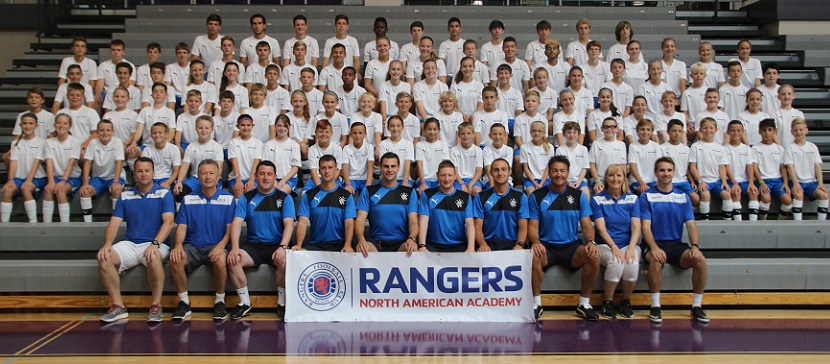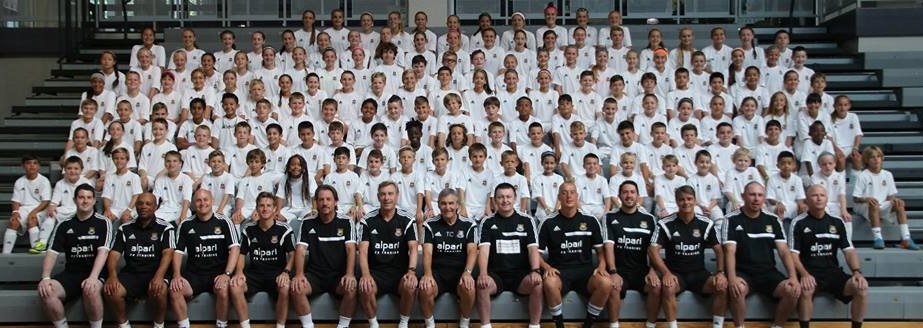Global Image Sports: What You Should Know About International Professional Soccer
Youth Soccer News: Global Image Sports (GIS) is a sports management company that provides unique opportunities for American youth soccer players through their partnership with top professional soccer clubs around the world, including West Ham United, ChievoVerona, Rangers Football Club and Stoke City. In addition to youth soccer camps, GIS also organizes tours for youth teams and assists clubs with direct access to coaching education and player opportunities with partner clubs.
Related Article: GIS BRINGS YOUTH SOCCER PLAYERS TO THE WORLD
SoccerToday checked in with Global Image Sports (GIS) for an update on the growing rise of international travel for individual youth soccer players seeking trials with EPL youth academies as well as competitive youth soccer clubs participating in soccer tournaments abroad. What exactly is the reality of becoming an international professional soccer player?
Youth Soccer News: The last 3 months have been the busiest in the history of Global Image Sports. They just finished their 2015 Youth Soccer National Camps at world class facilities in both Georgia and Arizona with nearly 1,000 players in attendance and were honored to have Academy Coaches and Directors attend from two English Premier League (EPL) clubs, an English Championship Club plus coaching staff from top clubs in Italy, Holland and Scotland.
“The level of coaching was absolutely first class,” said Mike Kelleher, Chief Operating Officer of Global Image Sports. “And first class coaching is what you would expect from top coaches whose sole responsibility at their football club is to produce professional footballers.”
Does GIS help identify and develop world class players who can compete on an international stage and play professionally? The simple answer is yes. One such player who has come via the GIS/USA Partner Club route is Sebastian Lletget who is now scoring goals in the MLS for the LA Galaxy. Lletget was playing with Santa Clara Sporting in Northern California and was identified by a West Ham United North American Academy scout. Lletget trained in London, England at West Ham for six years, playing one first team game before heading back to the USA to play in the MLS in his home state.
 A recent article in the New York Times, by Sam Borden was of great interest and further verified what Kelleher had confirmed in an interview published in February 2014.
A recent article in the New York Times, by Sam Borden was of great interest and further verified what Kelleher had confirmed in an interview published in February 2014.
Do most European soccer clubs strictly enforce FIFA’s rules on recruiting young players from abroad?
This is a common question asked by coaches and parents alike concerning young North American players training overseas and the chances they have of staying and playing at the Academy. Kelleher says, “GIS is proud to stay true to the values of legitimacy and honesty.” Basically – chances are slim. The big questions is not just whether or not a player has a European passport or can they get one. It is far more complicated as FIFA Article 19 States.
GIS believes the topic should once again be addressed. The growth of the game of youth soccer in the United States over the last 10-15 years has seen the increased presence of a number of mostly European professional football club’s on these shores, whether it be on the ever increasing number of television channels that show live soccer from every major European league or in the form of partnerships with youth clubs or leagues across the nation.
Some clubs use this as a marketing exercise, to grow their fan base, sell more replica shirts and ultimately increase their revenue numbers as the global game truly becomes global. Others are on a scouting mission to unearth a hidden gem who may be playing on the fields of New York, Chicago, Miami or Los Angeles. But how realistic is it to actually be discovered? For a player to be in a youth game in one of the countless leagues and tournaments in the USA and next be training and ultimately playing in one of Europe’s big leagues, is not as easy as some would have you believe.
 In the 1990’s horror stories of young African boys being abandoned and left to fend for themselves with no money or passports in European countries by so called “agents” promising the world and riches of professional soccer forced the governing body of world soccer, FIFA, to act and consequently implement Article 19 – “The Protection of Minors” across every country affiliated to FIFA.
In the 1990’s horror stories of young African boys being abandoned and left to fend for themselves with no money or passports in European countries by so called “agents” promising the world and riches of professional soccer forced the governing body of world soccer, FIFA, to act and consequently implement Article 19 – “The Protection of Minors” across every country affiliated to FIFA.
Article 19 States: International transfers of players are only permitted if the player is over the age of 18.
The article does offer three exceptions to that very clear cut rule:
• The player’s parents move to the country in which the new club is located for reasons not linked to football.
Such reasons could be a job offer, with adequate paperwork, visas, home rental/purchase agreements etc. to support the application.
• Players within the EU (European Union) between the ages of 16 and 18, and only if strict criteria is adhered to concerning the player’s education and welfare.
• Players living within 50 kilometers of an international border, may sign for a club that is no more than 50 kilometers on the other side of the same international border
For example a boy living in the USA within 50 kilometers of the Mexican border may sign for a Mexican professional football club provided that club is within 50 kilometers of the American border.
 Time and again there are articles or comments from players, parents and coaches that a player, invariably under the age of 18 is on trial from the USA at one club or another in Europe – this may well be true, but unless the player’s parents, as detailed above, move to the country for “reasons not linked to football” and have adequate proof that the reasons are not linked to football, the registration of the player at the respective country’s football association will be flatly rejected by FIFA.
Time and again there are articles or comments from players, parents and coaches that a player, invariably under the age of 18 is on trial from the USA at one club or another in Europe – this may well be true, but unless the player’s parents, as detailed above, move to the country for “reasons not linked to football” and have adequate proof that the reasons are not linked to football, the registration of the player at the respective country’s football association will be flatly rejected by FIFA.
Even if the player does sign for the Academy and his parents do move for “reasons not linked to football” unless that player has an EU (European Union) passport the chances of them obtaining a work permit to play football professionally may also be very slim.
This mostly depends on the European country they are based at, with England being notoriously the most difficult, strict rules backed by the most powerful players union in world football – the PFA (Professional Football Association), which includes in its work permit granting criteria that a non EU player must have played in 75% of his countries full national teams games within the past two years (note: full national team not youth representative teams).
GIS prides themselves on the legitimate and well established partnership with European Professional Football Club partners including West Ham United, Stoke City, Wolverhampton Wanderers, Genoa, ChievoVerona, FC Utrecht and Glasgow Rangers. Each partnership is in full cooperation of the Club’s Youth Academy – the department at the club responsible for developing young players into professional footballers — and offers access to the Academy’s elite coaches and players. Often people are confused with partnerships with a professional club’s community program which is not the same. The club is genuinely interested in having a presence outside their traditional boundaries and the Academy allows them to do that.
 GIS camp programs to North American youth soccer club partners offer coaching education plus player opportunities culminating in the Elite Academy Experience at the Academy of their professional partner club.
GIS camp programs to North American youth soccer club partners offer coaching education plus player opportunities culminating in the Elite Academy Experience at the Academy of their professional partner club.
American based youth soccer clubs who become GIS Affiliates can decide to bring players and coaches on a soccer tour to the various professional Academy partner clubs. Once there, they are treated as part of the football club; a true affiliate and not as tourists or a hindrance to the day-to-day business of the Academy.
“Perhaps some of the players that go on our Academy Experiences or affiliate club partner soccer tours will end up as professional soccer players and if we can help in the process along the way we will, but that is not our overall aim,” said Kelleher. “Put simply our aim is to continue to grow the game of soccer by offering partnerships and experiences that provide true value for players, parents and coaches alike.”
Kelleher spent five years at the English Premier League assisting it’s Director of Youth in implementing the English Football Association’s Academy program. He has lived in the USA for fourteen years and has worked at all levels of the game in the USA; grass routes, collegiate and professional leagues. He holds a USSF A coaching license and a Masters Degree in Sports Management from the University of Tennessee. He also passed the FIFA Player’s Agents Licensing Exam, but does not practice or act as an agent.






